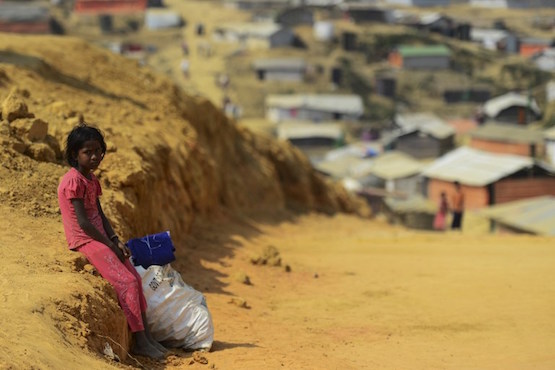Exodus to Bangladesh continues because Muslims feel unsafe and struggle for survival in northern Rakhine

A Rohingya refugee girl rests at Balukhali refugee camp in Bangladesh’s Ukhia district on Jan. 26. (Photo by Munir Uz Zaman/AFP)
February 8, 2018
Hundreds of Rohingya Muslims continue to flee Myanmar’s restive Rakhine State for neighboring Bangladesh despite a repatriation deal between the countries.
More than 688,000 Rohingya have fled Maungdaw, Buthidaung and Rathedaung townships in northern Rakhine following Myanmar’s military crackdown in August 2017.
Khin Mg, a Rohingya resident from Buthidaung, said 40-100 people from Buthidaung and Rathedaung have fled to Bangladesh each day in the past two weeks.
“People feel insecurity and struggle for daily survival because it is difficult to go to the farms or fishing for work,” he told ucanews.com.
Khin Mg said there is little prospect of Rohingya refugees returning to Rakhine from Bangladesh while the situation is not safe.
Around 850 people from 12 villages in Buthidaung arrived at Dawdu Tharya Creek to go to Bangladesh on Jan. 28, according to Myanmar’s Information Ministry announcement on Feb. 5.
Zaw Win, an ethnic Rakhine from Buthidaung, said Rohingya were being forced to leave Rakhine by a political agenda.
He said the government was trying its best to provide food and security for people but Rohingya continue to flee to Bangladesh.
“It is obvious that lobby groups have pressured people to flee to Bangladesh with the aim of getting their citizenship rights with the support of the international community,” Zaw Win told ucanews.com.
Both Zaw Win and Khin Mg spoke with ucanews.com just days before Amnesty International released a report on Feb. 8 about how the Myanmar security forces’ devastating campaign against the Rohingya population in northern Rakhine State is far from over. The rights group published new evidence of ongoing violations that have forced hundreds more people to flee in recent weeks.
In late January, AI said they interviewed 19 newly arrived Rohingya men and women in Bangladesh, who described how forced starvation, abductions and looting of property drove them to flee.
UN and diplomats visit Rakhine
Under an agreement made last November, Myanmar was due to start receiving Rohingya refugees from Bangladesh at two reception centers and a temporary camp near Maungdaw in northern Rakhine starting on Jan. 23 and continuing over the next two years.
But the plan has been delayed as Bangladesh needs to complete arrangements.
Myanmar officials have repeatedly said that all preparations have been made and they are ready to accept refugees.
On Feb. 6, Myanmar security adviser Thaung Tun led a delegation of diplomats from China, Singapore and India, officials from the Bangladesh embassy and UN resident and humanitarian coordinator Knut Ostby to the refugee facilities near Maungdaw.
Ostby later said on Twitter that the UN and UNHCR have the capacity, best practices and experience to help with repatriation and address the root causes of the crisis in Rakhine. “We are ready to support the solution,” he said.
ASEAN foreign ministers said on Feb. 6 that they looked forward to the expeditious start of the voluntary return of displaced persons to Myanmar in “a safe, secure and dignified way” without undue delay.
“The ministers stressed the need to find a comprehensive and durable solution to address the root causes of the conflict and to create a conducive environment so that the affected communities can rebuild their lives,” an ASEAN press release stated.
Crisis could affect regional security
UN human rights chief Zeid Ra’ad al-Hussein warned that the persecution of Rohingya Muslims has the potential to cause regional conflict.
“Myanmar faces a very serious crisis with a potentially severe impact on the security of the region,” Zeid told a regional conference in Jakarta on Feb. 5.
Zeid’s remarks came after an Associated Press investigation last week revealed five mass graves in northern Rakhine through interviews with refugees in Bangladesh and time-stamped cellphone videos.
The report detailed how Myanmar’s security forces and local Buddhists allegedly used acid to disfigure Rohingya victims of a massacre in Gu Dar Pyin village, Buthidaung township, to make it difficult to identify the bodies.
Myanmar’s government has denied that any massacres occurred and said its investigation team had found no evidence to support the claims made in AP’s report.
Rakhine’s state government said it is planning to sue AP.
Doctors Without Borders said in its own survey in December that at least 6,700 Rohingya Muslims were killed in Rakhine during the first month of the August 2017 crackdown by Myanmar’s military.
UN special rapporteur Yanghee Lee said on Feb. 1 after concluding a visit to Bangladesh and Thailand that the violence against the Rohingya Muslims bore “the hallmarks of a genocide.”
